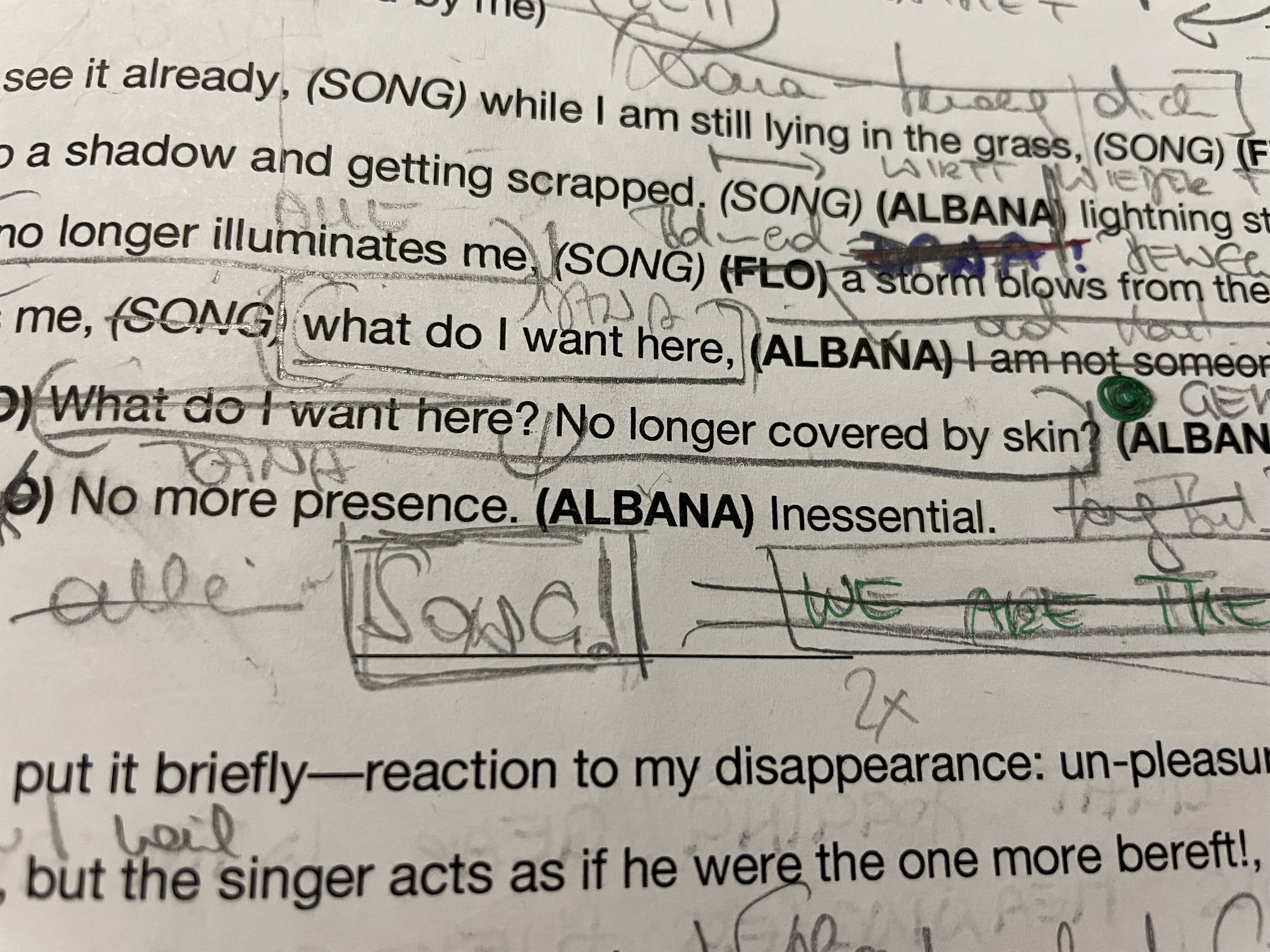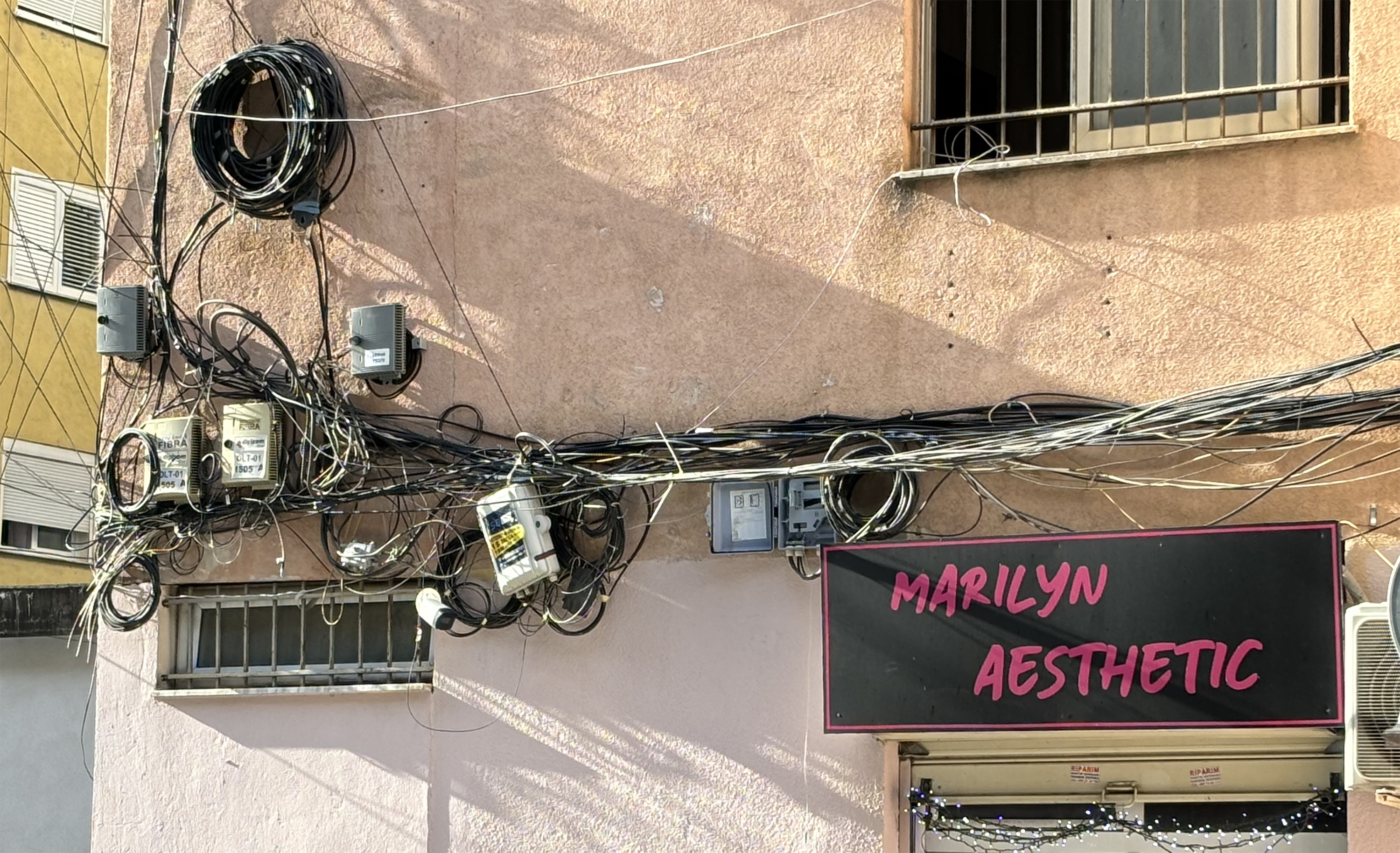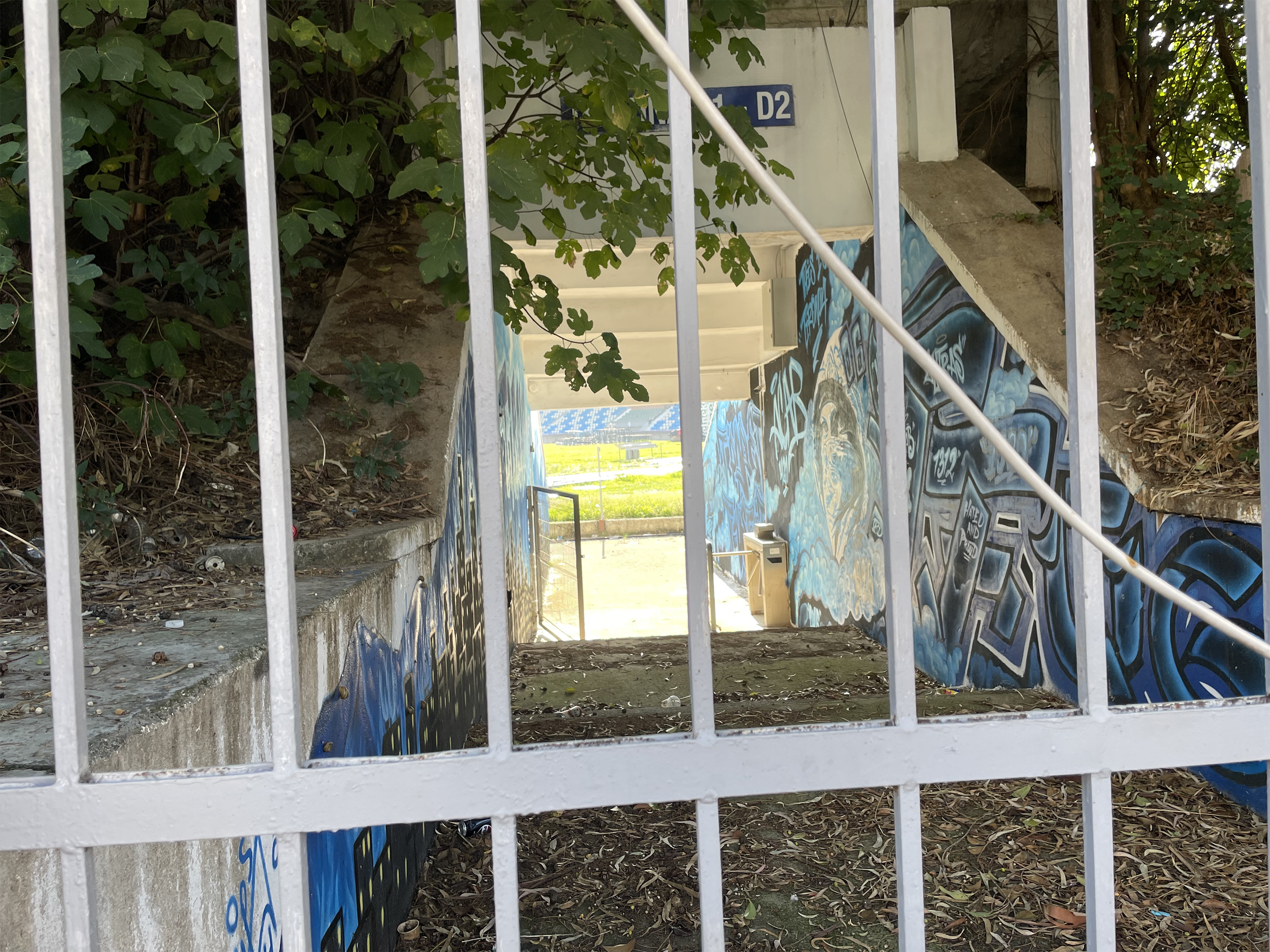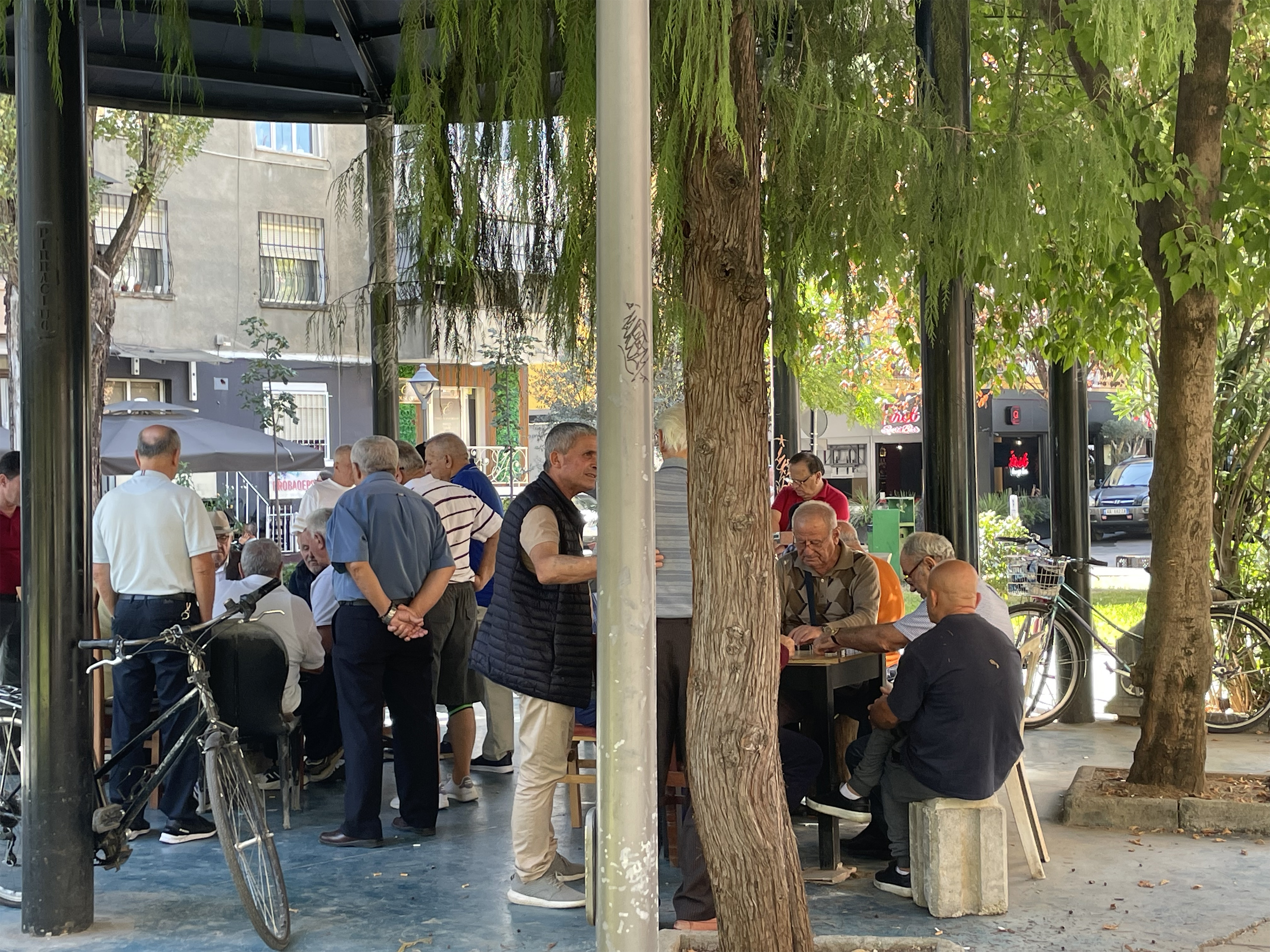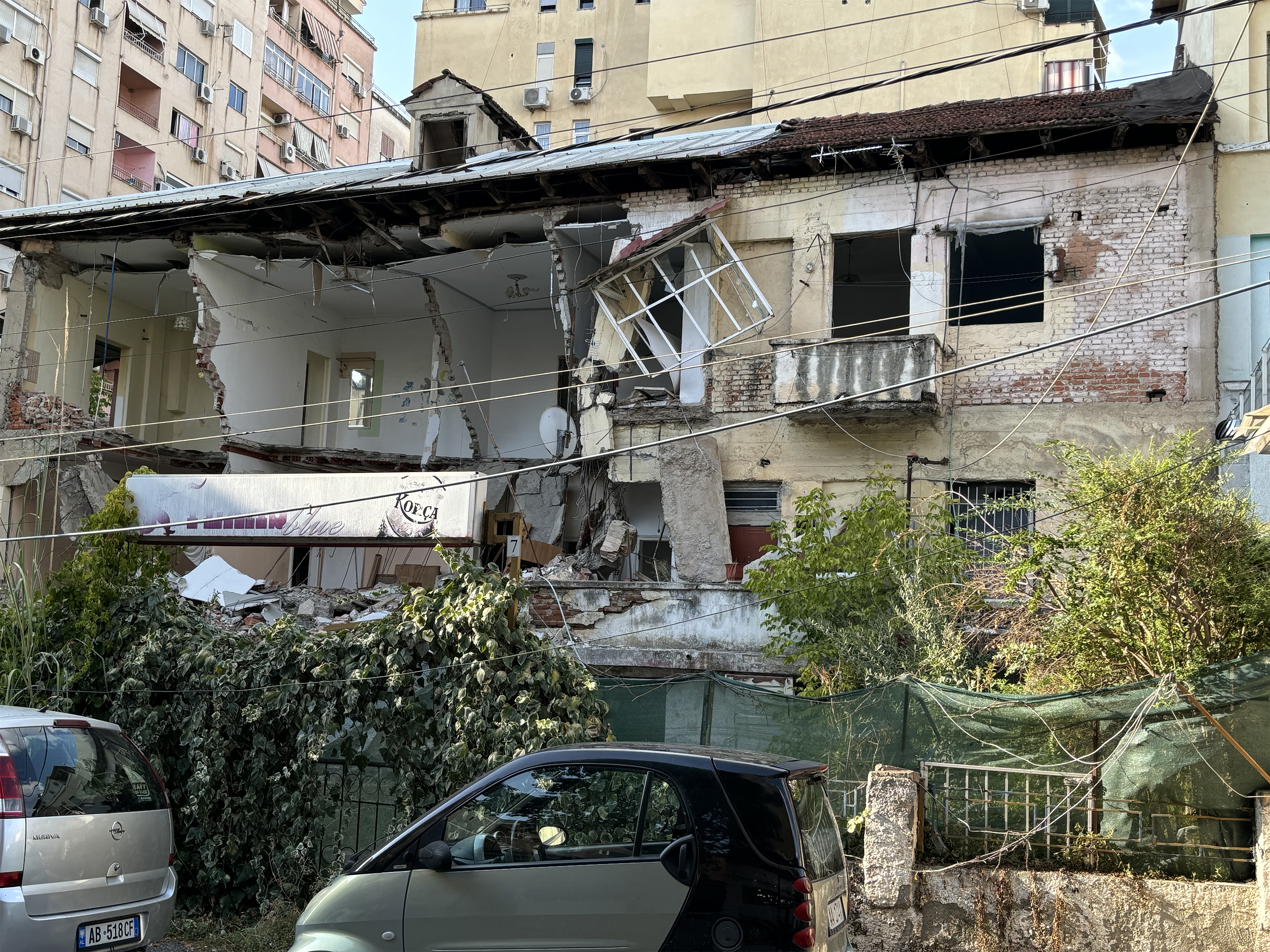
Tirana Journal 2024
Notes on the Staging and City

Tirana Journal 2024
Notes on the Staging and City
SHADOW. Eurydice says was the first performance of a text by Elfriede Jelinek in Albania. After my staging of the piece in Vienna in 2016/2017 and the English-language solo in London, New York and Washington in 2022/2023, this was yet another new production of SHADOW with an adapted version of the text – with Albana Kocaj, Flobensa Bezati and Adriana Tolka at the Teatri Eksperimental ‘Kujtim Spahivogli’ in Tirana, in English (translated by Gitta Honegger) with Albanian subtitles. That meant it was the first time that SHADOW was to be performed in a theatre.
Even though the audience was seated (in Vienna spectators could move around freely on the factory floor of the F23, gaining ever-new perspectives on what they could see and hear), we once again attempted to break down the boundary between stage and auditorium as much as possible. The first two rows were removed to the back of the stage, giving rise to a mirrored setting. The three actresses strutted into the venue like models (costumes: Sofi Kara) – in a blood-stained wedding dress (Flobensa Bezati), with a face marked from a beating (Adriana Tolka), with a gunshot wound near the heart (Albana Kocaj) – stigmata of mostly male, at times lethal violence. They first addressed the audience from the stairs in the stands and the area in front of the stage. Alexandra Pitz, the set designer, with whom we have worked for many years, hung a total of 106 costumes, carefully selected in shades of black and grey, a few light wigs in between, along the back and sides of the stage: projecting far into the auditorium on the left and right, they transformed the discrete spaces of the stage and auditorium into a single installation space.
Wolfgang Musil played his part as usual: his live electronics and sound design gave rise to ever-new sound spaces – the actresses used lavalier mics and Musil decided on the spur of the moment, during the live performance, from which of the eight speakers each voice would be heard.
Jelinek’s text, in a version specially abridged for these actresses, achieved its full impact via the character of each individual Eurydice being united as a scenic concert of three voices – always listening to each other, always ready to adopt each other’s lines, they occasionally spoke over each other while nevertheless remaining one. A stream of thought rife with puns, ideally compelling and cheerful at once.
But why this text yet again? Because of its complexity and its wealth of references, its musical elegance and beauty, its social urgency.
In SHADOW. Eurydice says what Eurydice says goes; she takes the floor, frees herself from attributions and expectations, including her own. The myth of Orpheus and Eurydice is told from a female perspective.
Gender equality has been achieved neither in Albania nor in other European countries; violence against women is growing in line with their efforts at independence and is repeatedly trivialised: SHADOW. Eurydice says offers material whose content and form is more topical than ever. Each reading proves that to be true.
Tirana – fast, loud, a raw beauty
Less than an hour and a half’s flight away from Vienna, upon landing you are immediately immersed in the fast and loud rhythm of the Albanian capital. 250 aircraft take off and land at the Nënë Tereza international airport every day, bringing countless, mainly young, tourists to the city. A multitude of taxis, most of them electric, take these visitors to the numerous ‘apartamenti’ and hotels; they are all designed for two to a maximum of five nights’ stay; you can pay in euros and in cash. Once a no-go zone around the estate of the former dictator Enver Hoxha in the city centre, the Blloku neighbourhood is now a party hotspot. A not insignificant proportion of tourists are foodies or even dental patients. There is a ‘Klinika dentare’ at every turn, most of them specialising in implants; even with travel and accommodation, the procedure costs much less here than in the ‘West’.
Wrecking balls hanging alongside construction cranes are a prominent feature of the cityscape. Tirana is growing rapidly, whereas the rest of the country is experiencing depopulation. The numerous German courses offered at the Goethe-Zentrum are fully booked; many well-qualified young people see no future in their homeland and are leaving Albania for the EU, USA and Turkey. Property prices are high, reaching Western European levels for new builds near the centre. Life is much more expensive than it was just a few years ago, but wages are not keeping up. Most people have at least two if not three jobs just to make ends meet.
Theatre is in a difficult position in the overheated atmosphere of the Albanian capital at the moment. People are struggling to get by and to offer their children better prospects than they have themselves. Some theatres are seeking salvation in entertainment formats that streaming services and countless TV channels can offer in better quality and in the comfort of people’s own homes. The old National Theatre in the city centre was an emblem of Albanian history and a flourishing venue in Albania’s present. It was torn down in the dead of night during a Covid lockdown in 2020, its repertoire cast out of the city centre. But there are still true aficionados who uphold the importance of the theatre as a public space where citizens can communicate in person and see themselves as constituent members of urban society.
This makes the consistently good teamwork on the production all the more enjoyable, especially with the artists and the remaining dedicated staff at the theatre. Ever since our collaboration in 2018 (Albanian-language premiere of Werner Schwab’s Die Präsidentinnen), we have been allies and friends who together support a thriving theatre scene and shared European culture.
SM in December 2024
